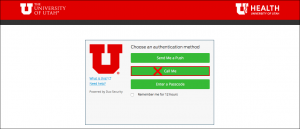JUMP TO:
Walk with pride
Continuing Education and Community Engagement is Moving to Research Park
Office of Global Engagement Leadership Change
“The Bone Pile: Essays on Nature and Culture”
UMFA curator wins national award
Bend with your knees, not with your . . . ouch!
Duo 2FA phone call, text options will be discontinued July 17, 2018
Nominate a veteran
WALK WITH PRIDE[bs_row class=”row”][bs_col class=”col-sm-4″] [/bs_col][bs_col class=”col-sm-8″]The University of Utah is showing its PRIDE for our LGBTQI community by entering a float into the Pride Festival Parade Sunday, June 3, 2018. Through word of mouth alone, a large number of people have shown interest. We want to continue that momentum and formally ask for more people to participate. Registration is required and spots are limited. A one-of-a-kind shirt has been made for the occasion so sign up early here.[/bs_col][/bs_row]
[/bs_col][bs_col class=”col-sm-8″]The University of Utah is showing its PRIDE for our LGBTQI community by entering a float into the Pride Festival Parade Sunday, June 3, 2018. Through word of mouth alone, a large number of people have shown interest. We want to continue that momentum and formally ask for more people to participate. Registration is required and spots are limited. A one-of-a-kind shirt has been made for the occasion so sign up early here.[/bs_col][/bs_row]
Continuing Education and Community Engagement is Moving to Research Park[bs_row class=”row”][bs_col class=”col-sm-4″] [/bs_col][bs_col class=”col-sm-8″]For anyone who has been a part of the University of Utah for any length of time, the Annex and Continuing Education and Community Engagement have been synonymous. But the times, they are a-changin’.
[/bs_col][bs_col class=”col-sm-8″]For anyone who has been a part of the University of Utah for any length of time, the Annex and Continuing Education and Community Engagement have been synonymous. But the times, they are a-changin’.
On May 14, CECE will officially open the doors to its new building in Research Park, located at 540 Arapeen Drive. CECE is thrilled to be moving to a beautiful building with modern technology that has been extensively remodeled with the student experience in mind. CECE classes that were once held in the Annex will be offered in the new building starting summer semester 2018. Please note, Youth Education staff will be located in the Annex (and President’s Circle for Club U) for summer camps and moving in the fall. Stay tuned for a grand opening invitation to tour our new space in fall of 2018. Come visit us.[/bs_col][/bs_row]
Office of Global Engagement Leadership Change[bs_row class=”row”][bs_col class=”col-sm-4″] [/bs_col][bs_col class=”col-sm-8″]Mike Hardman, chief global officer, will step down from his post effective June 30, 2018. Next year, he will continue in a reduced time role as a special assistant to the Office for Global Engagement.
[/bs_col][bs_col class=”col-sm-8″]Mike Hardman, chief global officer, will step down from his post effective June 30, 2018. Next year, he will continue in a reduced time role as a special assistant to the Office for Global Engagement.
During Hardman’s five-year tenure as chief global officer, the university’s international profile and visibility have grown considerably. He was instrumental in establishing the University of Utah Asia Campus in South Korea in 2014. The UAC enrollment has grown to more than 400 students in seven programs of study and this spring, UAC celebrated commencement for its second graduating class.
Hardman joined the U’s faculty in the Department of Special Education in 1975. His contributions and service include key leadership roles as the Interim Sr. Vice President for Academic Affairs, dean of the College of Education, chair of the Department of Special Education, chair of the Department of Teaching and Learning, and President and chair of the University of Utah Asia Campus Board of Directors. He holds the title of distinguished professor, served as PI on $12.7 million in federal and state-funded research and training projects in the areas of educational policy and reform, and authored/co-authored 10 textbooks (32 editions), as well as nearly 100 national and international refereed journal articles, monographs and book chapters.
Chris Ireland, professor of medicinal chemistry, has agreed to serve as the interim chief global officer, effective July 1, 2018. Through his current role as the chief administrative officer of UAC, and previous role as dean of the College of Pharmacy, Ireland has significant experience in the international arena. He has an exceptional record as a scholar and leader and has earned the trust and respect of colleagues across campus.[/bs_col][/bs_row]
“The Bone Pile: Essays on Nature and Culture”[bs_row class=”row”][bs_col class=”col-sm-4″] [/bs_col][bs_col class=”col-sm-8″]In his recently published book, Maximilian Werner, assistant professor, writing and rhetoric studies, uses the vehicles of fly fishing, every day experience, and sacred rituals to explore the origins and limitations of human behavior and ideas. “The Bone Pile: Essays on Nature and Culture” includes essays that range from the quasi-mystical to the polemical and from the polemical to the ecological. However different each of these essays may be, together they represent an incisive study of human and nonhuman life and of the environment that unites us.
[/bs_col][bs_col class=”col-sm-8″]In his recently published book, Maximilian Werner, assistant professor, writing and rhetoric studies, uses the vehicles of fly fishing, every day experience, and sacred rituals to explore the origins and limitations of human behavior and ideas. “The Bone Pile: Essays on Nature and Culture” includes essays that range from the quasi-mystical to the polemical and from the polemical to the ecological. However different each of these essays may be, together they represent an incisive study of human and nonhuman life and of the environment that unites us.
To read more about Werner’s new book and why he wrote it, click here.[/bs_col][/bs_row]
UMFA Curator Wins National Award for Excellence[bs_row class=”row”][bs_col class=”col-sm-4″] [/bs_col][bs_col class=”col-sm-8″]Congratulations to Leslie Anderson, UMFA curator of European, American, and regional art, who won a national Award for Excellence from the Association of Art Museum Curators (AAMC) for her re-envisioning of the Museum’s American and regional art galleries. Full story at umfa.utah.edu/AAMC-Award.[/bs_col][/bs_row]
[/bs_col][bs_col class=”col-sm-8″]Congratulations to Leslie Anderson, UMFA curator of European, American, and regional art, who won a national Award for Excellence from the Association of Art Museum Curators (AAMC) for her re-envisioning of the Museum’s American and regional art galleries. Full story at umfa.utah.edu/AAMC-Award.[/bs_col][/bs_row]
Bend with your knees, not with your . . . ouch![bs_row class=”row”][bs_col class=”col-sm-4″] [/bs_col][bs_col class=”col-sm-8″]Despite all the warnings, at some point, we’ve all lifted something heavy — using our backs instead of our legs — in a twisted, jerking motion. Our bodies will pay for it for a few days. But for many, that sort of debilitating pain is an everyday occurrence with no end in sight. Chronic pain is one of the leading causes of disability and reduced quality of life in the U.S., affecting over 100 million Americans and costing nearly $600 billion annually, according to a 2017 report by the Health and Medicine Division of the National Academies.
[/bs_col][bs_col class=”col-sm-8″]Despite all the warnings, at some point, we’ve all lifted something heavy — using our backs instead of our legs — in a twisted, jerking motion. Our bodies will pay for it for a few days. But for many, that sort of debilitating pain is an everyday occurrence with no end in sight. Chronic pain is one of the leading causes of disability and reduced quality of life in the U.S., affecting over 100 million Americans and costing nearly $600 billion annually, according to a 2017 report by the Health and Medicine Division of the National Academies.
Existing treatment options for chronic pain are insufficient, and as a result, 5 million to 8 million people with chronic pain are treated with opioids, as stated by the U.S. Department of Health and Human Services in 2017. Chronic lower back pain in particular is the No. 1 non-cancerous pain for which opioids are prescribed. Current evidence for the long-term effectiveness of opioids is lacking, and there is considerable growing concern about side effects such as worsened mental health, potential for addiction, and accidental overdose. Many people taking opioids for chronic pain also report that their pain and ability to carry out daily activities are not sufficiently improved.
So, what are these individuals to do?
Researchers at the University of Utah are currently exploring two Strategies to Assist with Management of Pain (STAMP). The goal of the STAMP study is to offer people with opioid-treated chronic lower back pain one of two safe, non-medication supplementary treatments: Mindfulness Meditation (MM) or Cognitive Behavioral Therapy (CBT), both of which have been tailored specifically for patients with chronic back pain. Participants in the STAMP study are trained in these techniques while continuing with their usual medical care. Both MM and CBT have strong research support for the treatment of chronic pain. The goal of the study is to find out which treatment is most beneficial to patients for long-term pain management.
Social workers and other clinicians who are interested in this study for their patients with opioid-treated chronic lower back pain can learn about this study at stampstudy.org. With this research, we hope to pave the way for more readily available treatment options to safely reduce the suffering of people experiencing chronic lower back pain.
I am interested in the STAMP study in:
- Boston
- Wisconsin
- Salt Lake City[/bs_col][/bs_row]
Duo 2FA phone call, text options will be discontinued July 17, 2018[bs_row class=”row”][bs_col class=”col-sm-4″] [/bs_col][bs_col class=”col-sm-8″]On July 17, 2018, Duo phone call and text message options for two-factor authentication (2FA) will be discontinued. Users need to select another method for Duo 2FA to log in to the majority of university applications after July 17.
[/bs_col][bs_col class=”col-sm-8″]On July 17, 2018, Duo phone call and text message options for two-factor authentication (2FA) will be discontinued. Users need to select another method for Duo 2FA to log in to the majority of university applications after July 17.
The Strategic Information Technology Committee approved this decision for a number of reasons – most importantly, recent industry guidance and practice has indicated that phone calls and text messages are vulnerable and not considered secure methods of authentication. There is also a significant cost associated with providing these authentication methods. The phone call option was intended to be a backup or emergency method for using Duo, yet for many it has become their primary method. The new backup option for Duo authentication will now be completed through the central university help desks (contact information below).
You may choose one of the following options for 2FA, which are used by the majority of campus and U Health users:
Duo mobile app:
- Easiest and fastest method
- Install on a smartphone or tablet (includes Apple, Android, and Windows mobile devices)
- Two options to authenticate:
- Mobile push notification (select “approve” or “deny” from your device’s home screen or Duo notification page – no need to type in a code)
- Type in a passcode (network connectivity is not required for this option)
Duo hardware token:
- Available for purchase at the University Campus Store and the Health Sciences Store
Visit the 2FA webpage, Duo 2FA overview article, and Duo tutorial video found in Pulse (U Health) or Bridge (campus) for more information. If you have questions, contact the UIT Help Desk (801-581-4000, option 1) or ITS Service Desk (801-587-6000) for assistance.[/bs_col][/bs_row]
Nominate a Veteran[bs_row class=”row”][bs_col class=”col-sm-4″] [/bs_col][bs_col class=”col-sm-8″]The University of Utah Veterans Day Committee honors veterans each year based on their honor, courage, commitment and sacrifice during their military service to our nation. Nominations for this year’s ceremony are due by July 31, 2018.
[/bs_col][bs_col class=”col-sm-8″]The University of Utah Veterans Day Committee honors veterans each year based on their honor, courage, commitment and sacrifice during their military service to our nation. Nominations for this year’s ceremony are due by July 31, 2018.
For more information or to nominate a veteran to be honored, go to veteransday.utah.edu or call 801-587-7722.[/bs_col][/bs_row]
